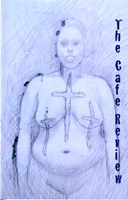Hit & Run

by Betsy Sholl
It wasn’t a Mac truck wanting me dead,
just a blue car, young woman on the phone.
Good, Biene — Biene — the license plate read.
At least, that’s what the other drivers said,
who circled back to check, with worried tones:
no black truck or semi wanting more dead,
just a blue car clipping me as it sped
through the crosswalk, eager to get home,
to sweet Biene, as its license plate read.
But a car aimed straight at you? That is dread.
Halfway across the street, I froze, a stone.
Maybe there was no truck wanting me dead,
but still it seemed my whole life had led
to that one moment of impact, crushed bone —
to bruise, to Biene, the license plate red,
as if some death – force prowled the earth and fed
on humans, struck down en masse or alone.
No, it wasn’t a truck wanting me dead.
Still, Biene, Biene, that license plate read . . .
Adagio For Strings

by Betsy Sholl
The radio’s weeping again, this time
without commentary, so it could be for anything,
these strings brought to the breaking —
for those rough oceans of childhood
endlessly pulling their green carpets out from under,
till no one could stand,
for that radioactive over – voice with its endless
half–life telling us the Russians are coming,
and whatever else got inside my sweet cousin’s head
with voices he couldn’t turn off.
How easy it used to be, nothing in the waves
but water, its green– gray flux gently lifting us,
that sweet cousin dangling seaweed in my face,
laughing as I squealed,
nothing in the music, but backbeat and hormones,
always another station when the news came on,
another song out there stronger than static.
But once as I tuned past some jabbering smug–mouth,
the knob fell off, so that know – it – all fear monger
wouldn’t shut up. I was doing 60 on back roads,
and considered gunning straight for the nearest tree.
Lost in his no–exit room, at first my cousin
could cover his ears and bang the walls
against those voices upping the volume in his head.
But oh you sobbing violins with your slow dissonant shiver
pulling down the towers all over again,
unlocking the room where that troubled boy hangs,
soon enough even the walls were shouting at him,
the coat rack wouldn’t shut up, there was no outside,
for him no shimmering strings
only sirens, fingernails on slate, bows shrieking
across a rusted bridge —
With Jack Myers in France
by Paul Christensen
You were my guest in southern France
once, with Thea fussing with car rentals
on the phone, my wife fixing
breakfast at the counter
of our medieval village house.
I told you stories about the war
and René Char, the olive mill
down the street, now a ruin,
the old farmers with their tanks
of poison heading out into the vineyards.
Good stuff, history and gossip.
But you were smiling about
a girl whose voice we heard
below the window, in the narrow street.
Out in the mountain air, car
weaving down one –lane roads
to where the infantry marched
behind Hannibal’s 37 elephants,
I had Jack’s silvery attention
when I said the hills were full
of gypsies picking cherries.
Gypsies rang like triangles
from some long–ago kindergarten
where the teacher tapped her foot
and the kids, you among them,
struck the pure silver note
that died in the air, like a cherry
falling into a gypsy woman’s mouth.
Jack, I must tell you the history
of the world before we reach Manosque,
where your car may or may not
be waiting. The French, you know.
But you were somewhere else,
perhaps just rising from your bed
in Lynn, a boy still, looking
for his shoes. Outside, the snow
had fallen, soft as the satin
in a casket, with the mournful faces
gathered over it, looking down
into that indefatigable silence
each of us fought with our words.
Here’s the tomb of Camus, beside
his wife, two flat stones covered
in dark ivy. The graveyard small,
inconsolable in the dregs of winter clouds.
Lourmarin, then Cadenet, the plane
trees further south, soon the highway
to Aix, and all the marvels of stone
in which the people live. And die.
Adieu, mon ami, mon collègue,
poet, bel esprit, fellow traveler,
wanderer over the quiet
stony fields where one might
find a poem after a long day’s walk.
I’m here now, the cold winter
silence knotted in the brown thyme,
the river flush with rain,
tumbling white and gray
over the weed – shot river bed
as it heads west to Avignon, and beyond.
Jacob William

by Paul Christensen
I was upstairs in Jack’s house
on the flat suburban prairies
north of Dallas, tossing
among the words and muses
of his little studio. Ten a.m.,
with the stairs creaking
as I came down, the kitchen
air singed by strong coffee.
He was gone, and Thea
left a note on the fridge.
I ate the plums, so cold
and so delicious she
was saving for Jack’s supper.
A mug of java, a chair
suspended in the half –urban
sunlight of the room,
the working world having
left this island to the crows.
I heard his son Jacob
in the living room. He wore
a robe over his lanky bones
and greeted me kindly,
took the opposing chair.
There we were, two orphans
of Jack’s hospitality, homeless
in this wide, too sunny plain.
Thank god for the roofs
that contain our imaginations,
I said, and he looked up
as if I were making sense.
He died at twenty – three, letting go
from a rope Jack had tied
securely to the sky,
and I could understand
after a morning’s unrehearsed
duet of nut cracking
why he loved him.


